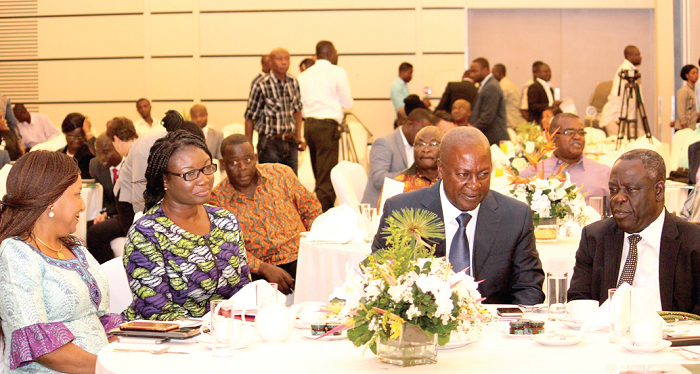
Public debt to reduce to 40% of GDP by 2021 — Prez Mahama
President John Dramani Mahama has expressed the commitment of the government to reduce the public debt to about 40 per cent of the country’s gross domestic product (GDP) by 2021.
Advertisement
He said the government had been able to reduce the country’s debt from 73 per cent of GDP to 67 per cent of GDP and had put a cap of GH¢500 million on borrowing each year to prevent a situation where the country’s debt stock could be worsened.
President Mahama was speaking at the Ghana Investment Promotion Centre (GIPC) 12th quarterly Chief Executive Officers (CEOs) Breakfast Seminar held in Accra yesterday.
The GIPC Breakfast Meeting series, dubbed: “The Presidential Breakfast Meeting with the Ghanaian business community”, was introduced in 2013 by the CEO of the GIPC, Mrs Mawuena Trebarh, with the objective of developing dynamic and innovative solutions to some national economic challenges.
“We’ve come from a high of at least 73 per cent of GDP to about 67 per cent of GDP currently and my indication is that this will continue to go down because we have put a cap on commercial borrowing”, he stressed.
The President said the government had also introduced, as part of the International Monetary Fund (IMF) programme, a public debt management strategy to control government borrowing and stop crowding out the private sector.
President Mahama told the business community that all the tough decisions that were taken regarding the economy were in the interest of the business sector.
“The success of business and industry is our success. We’ve had to take tough decisions – I am sure that you all understand that we had to take them in order to create a better environment for you.
Inflation
Touching on inflation, the President said its major cause was the rise in the deficit, which also resulted in interest rates ballooning and the cedi depreciation.
While asserting that no business could survive in an environment like that, he thanked the business and private sector for its support, saying that the tough decisions that were taken were beginning to yield results.
“Inflation did a dramatic dip and we hope that it will end at what we targeted — at least 14 per cent by the end of the year. And we hope that going into 2017, we can bring it down to a single digit,” he said.
Supporting private sector
President Mahama said there was the need to find other ways to support the private sector, especially those in the export business, saying that had birthed the Ghana EXIM Bank, which would be inaugurated in the next few days.
The President said the government was also looking at improving lending to the small and medium-scale enterprise sector through the skills development fund and had also asked the banks to introduce SME lending, which he hoped could become a strong growth area in the financial services sector.
Other areas
President Mahama listed five areas where great strides had been made by the government — the country’s wage burden, dealing with what he termed an unsustainable petroleum subsidy, electricity generation and tariffs, water supply, as well as education, health care and roads.
He indicated that from a high chunk of 70 per cent of the budget that the about 600,000 public sector workers took yearly in wages, the government had gradually brought it down to 51 per cent and hoped to further bring it down to 49 per cent and then to 40 per cent by 2020 to get closer to the ECOWAS agreed figure of 35 per cent.
On electricity, he said the government had fast-tracked the generation capacity to pool 850MW of additional power, making it the fastest ever in Ghana and the second highest generation in West Africa with over 2,000MW.
President Mahama said the country was at the risk of experiencing over generation and urged businesses to build more industries that would require power because the cost of the excess power generated would have to be paid for.



